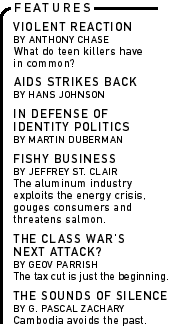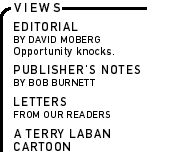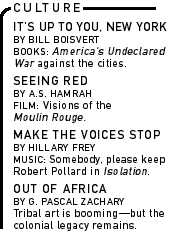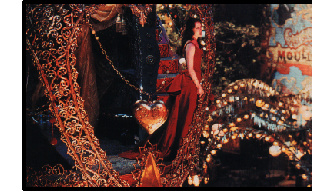

|

|

|

|
|
|
| |
|
|
|
Moulin Rouge
Nobody likes a medley. Nature abhors a medley, and so does Art. Spare us the medleys. By last winter or maybe before, TV ads had repeatedly informed us that a new film "from visionary director Baz Luhrmann" was imminent. Again and again the voice that booms portentously from movie trailers let us know that the visionary film Moulin Rouge was on its way, it was coming, it was about to be released and there was nothing we could do about it. It began to sound threatening, this "visionary" chant, like a warning, like Luhrmann was a Nostradamus with news of our destruction, news which for some reason he'd decided to impart in the form of a can-can musical with Nicole Kidman. Luhrmann's previous effort, a fledgling visionary work called William Shakespeare's
So maybe "visionary" is not the right word. But it sounds nice, "visionary." Maybe it's in Luhrmann's contract. He has a Visionary Clause. You say my name, you say "visionary" first. So officially anyway, he's a visionary. Why not? Doesn't cost the studio a dime. Here's a news item from France, however, that cost the studio a pretty penny in promotions and party decorations. At the Cannes film festival, Moulin Rouge got a six-minute standing ovation. In their day they have booed Antonioni's L'Avventura, Dreyer's Gertrud, Bresson's L'Argent and Jarmusch's Dead Man, but in 2001 they rose to their feet for Moulin Rouge and stayed there for one-tenth of an hour. Doesn't that prove Luhrmann's bona fide? He's a visionary all right: He sees things you don't. He saw France, he saw Nicole Kidman's underpants, evidently he's also seen Children of Paradise, Kiss Me Kate, A Clockwork Orange, One from the Heart, City of Lost Children and Hawaii Five-O. That's right, Hawaii Five-O. How's that for pomo pastiche? Stealing from those other movies, that's predictable; add Hawaii Five-O, you get a standing O. Thus in Moulin Rouge, Ewan McGregor poses on his writer's-garret balcony in 1899 Paris like he's Steve McGarrett in the credits to the beloved '70s cop show; the camera flies over the city right into his hairstyle. Was it the garret/McGarret connection that inspired Luhrmann to swoop like that? McGregor, McGarrett? McGregor's character is named Christian, Steve McGarrett was played by Jack Lord. Both characters approach their work religiously. They loom over vice-ridden cities and look down, and only they can make order from the confusion below. In the end, love's not for them. They have a higher calling. O.K., maybe this is an unproductive line of inquiry. You don't question a visionary, you just receive his vision and you luxuriate in it until you're puckered. Luhrmann's frenetic, overstuffed approach is designed to thwart criticism or even reflection. He insists that his film's hollowness is beside the point, or that without the emptiness at its core his film wouldn't be the celebration he intended. For all its undemanding visual opulence, Moulin Rouge demands that you never look away, for fear that you might miss something even more dazzling than what came before. But in the end it's not the kind of film you watch, it's the kind of film you have on. The feeling that it's having you on is as inescapable as its oppressive production design, a claustrophilic scheme seemingly inspired by a board game Vincent Price used to advertise in the '70s. Moulin Rouge is a musical without a complete musical number, a dance film without a dance sequence, a film about a writer that wasn't written. It was cobbled together by choosing only the most obvious post-Beatles song lyrics to animate its repetitive situations, and it tries to convince you that it's reinvigorating those song lyrics as it embraces pop cliché so it can bring you a higher love. It owes a lot to Madonna, who's invoked in its music-video style and by quoting lyrics from her songs. When Nicole Kidman is introduced as Satine, principal dancer at the Moulin Rouge and noted courtesan, an ominous version of "Diamonds Are a Girl's Best Friend" passes dubbed through her lips, and Luhrmann has her combine it with a line from "Material Girl." To fully appreciate how clever this is, you have to know that Madonna's video for that song recreated Marilyn Monroe's "Diamonds" number from Gentlemen Prefer Blondes. Above Kidman's head, a sign at the top of the stage reads "Diamants," and the narration (of course there's narration) informs us of the dancers that the habitués of the nightclub "called them the diamond dogs." Digital diamond dust falls over the scene, diamond jewelry is proffered and snatched everywhere. We're unavoidably reminded that diamonds are forever, in case we forgot. This kind of sensory overkill--where what is seen is said and what is said is seen--proves Luhrmann thinks his audience is both desperate and easily entertained; that it has an attention span shorter than John Leguizamo's throwaway dwarf character Toulouse; that it doesn't know how to read and would be offended if it were asked to. When McGregor types out "The End" as the film ends, he reads it on the soundtrack, too. Just to be sure the audience knows what to do at that point, the sound of applause accompanies a falling curtain. Kidman, who also recalls Rita Hayworth in Gilda (she can't help it), is all alone out there; Luhrmann, so busy splashing everything with the froth used to dye carnations and turn beer green, forgot to direct her. Her voice is disembodied, piped-in. McGregor offers no help. Their scenes together play like they were shot at the opposite ends of a tunnel. They're sexless and dull even when embracing naked. The other actors are displayed in boxes and piled up. Crammed into small spaces the better to make funny faces in close-up, none of them seem like they were ever in the same room together. They're reduced to moustaches and lipstick. A whole troupe of dancers is on hand; none of them is given a personality or dialogue. Luhrmann cuts every scene so there is no scene, just a series of music video fragments, and no emotion creeps in, although the characters weep and wail and kick. Jim Broadbent, a likable actor cast as the nightclub's impresario, comes off as so desperate to escape Luhrmann's Captain Kangaroo conception of his character that he channels the prop-comic Rip Taylor to keep himself interested. Richard Roxburgh's Duke, a stock villain, would've been better portrayed by Spinal Tap's Michael McKean. At least he knows that to be funny, you don't act funny. No one is funny in Moulin Rouge. When Luhrmann directs them, he directs them to be hilarious. The words "amoral" and "bohemian" are constantly rolled around in this film's mouth, but Moulin Rouge is as amoral and bohemian as My Little Pony. Its art-vs.-commerce plot is designed to touch the heart of the 11-year-old girl inside the window dresser in all of us, and it has all the tragic romance of a date with Poet Ken in Consumptive-Prostitute Barbie's Montmartre Playhouse, complete with all the accessories your parents could wrap up at Christmas. By the film's end, you hope for the triumph of commerce over art,
surely the film's subconscious message all along. Moulin Rouge
seeks to convince us that, today, Elton John and Baudelaire amount
to the same thing, and it makes you never want to hear the word
"spectacular" again, much less see one. If its goal was to reveal
the emptiness of postmodern bricolage at the blockbuster level,
it has succeeded. By any other standard, it's a mess. Its cleverness
is greasy. The medleys in a Shriner's parade are more thrilling.
When you're a visionary, there's a lot of stuff you don't have to
do. Baz Luhrmann has exercised his prerogative, and how. A.S. Hamrah also writes for Hermenaut and Suck.com. He can be reached at hamrah@hermenaut.com.
|


